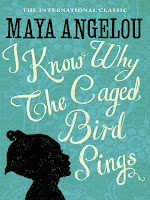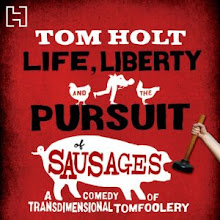 Synopsis: A troubled young man commits the perfect crime - the murder of a vile pawnbroker whom no one will miss. Raskolnikov is desperate for money, but convinces himself that his motive for the murder is to benefit mankind. So begins one of the greatest novels ever written, a journey into the criminal mind, a police thriller, and a philosophical meditation on morality and redemption.
Synopsis: A troubled young man commits the perfect crime - the murder of a vile pawnbroker whom no one will miss. Raskolnikov is desperate for money, but convinces himself that his motive for the murder is to benefit mankind. So begins one of the greatest novels ever written, a journey into the criminal mind, a police thriller, and a philosophical meditation on morality and redemption.Review: I'll start with a quote from Virginia Woolf about Dostoevsky because she puts it better than I ever could ...“The novels of Dostoevsky are seething whirlpools, gyrating sandstorms, waterspouts which hiss and boil and suck us in. They are composed purely and wholly of the stuff of the soul. Against our wills we are drawn in, whirled around, blinded, suffocated, and at the same time filled with a giddy rapture. Outside of Shakespeare there is no more exciting reading.”
If he has written a better book than this then all I can say is wow! that book must be phenomenal because this one is just extraordinary. The book opens with a murder and that you continue, if not to have sympathy, then to have compassion for the murderer is quite an achievement. It's not as if the murder is an act of revenge or honour. It's a cruel and senseless act (which, through mischance, becomes even more so) and we're not told why Rodion Romanovich Raskolnikov decides to commit it apart from that he feels in some way pre-destined to do it and also that he feels he could do some good with the wealth that will come from it and become an extraordinary man.
click here to continue review - possible spoilers
Dostoevskys writing is quite reminiscent of Dickens (calling to mind 'Our Mutual Friend' in particular), perhaps even tipping into Dickensian sentimentality at times with his depiction of prostitute (not in the unwashed, syphilis ridden way or yet in the glamorous, good time girl sort of way but in the virtuous, chaste, sacrificing all for the family or they would starve type of way) Sonya, but he doesn't go overboard and get quite as maudlin as Dickens. Raskolnikov is drawn to Sonya and she may well prove to be his saving grace. There's a great mix of characters, the destitute Marmeladovs, the cunning and twisted Svidrigailov, the good humoured and amiable Razumhikin and Rodion's devoted and loyal mother and sister.
It is dark, brooding and claustrophobic (for a lot of it you are festering inside Rodion's head), there is hardly any light, but for all that it's still hugely entertaining. There is plenty of absurdity and of course lots of suspense .. you get caught up very quickly in this immense battle of good and evil playing out in the heart of Raskolnikov. But the tension doesn't belong solely to him there is plenty to keep you on the edge of your seat in the scenes between the evil Svidrigailov and Rodion's sister Dunya.
I'll end with another famous quote ..."All I can say is, it nearly finished me. It was like having an illness." -- Robert Louis Stevenson on reading Crime and Punishment.








Perhaps it's his reaction to what he's done that convinces us his heart is not truly evil. His body sinks into illness and fever and his unquiet mind is a maelstrom of hallucinations and delusions which at times border on insanity. If anyone is going to incriminate him then it is he himself for his behaviour is nothing short of ludicrous. He revisits the scene of the crime and makes preposterous statements which hint at his guilt. He veers from wishing to conceal his crime to wishing to confess it, it's a burden that weighs him down and this burden is intensified one hundred fold when his behaviour attracts the suspicion of police detective Porfiry. I loved the depiction of Porfiry with all his wily sarcasm and veiled hints. His words weigh so heavily on Raskolnikov that they do far more damage than any outright accusation or arrest could ever do. They gnaw away at him and he tortures himself with thoughts of Porfiry and what he may or may not know. But more crushing to him than the crime itself is the fact that he has failed to execute it properly .. he will never be the great man he aspired to be and his pride is wounded.